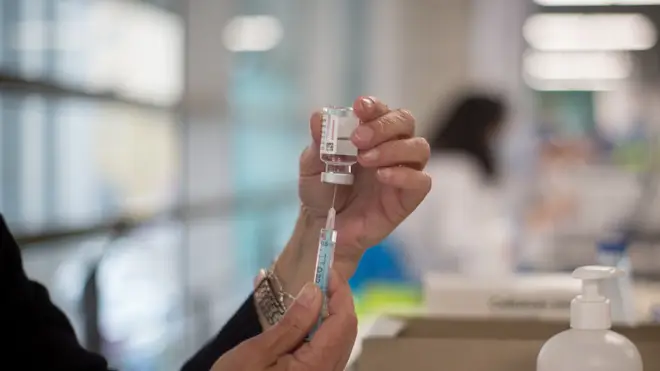
Henry Riley 7pm - 10pm
14 April 2021, 00:04

A study looking at whether the Oxford/Astrazeneca and Pfizer coronavirus vaccines can be safely mixed for the first and second doses will be expanded to include two additional jabs.
Researchers running the Com-Cov study, launched in February to investigate alternating doses of the first two jabs to be rolled out across the UK, have announced the programme will be extended to include the Moderna and Novavax vaccines.
Led by the University of Oxford, the extra study will seek to recruit adults aged over 50 who have received their first vaccination in the past eight to 12 weeks.
Matthew Snape, associate professor in paediatrics and vaccinology at the University of Oxford, who is chief investigator on the trial said: "The focus of both this and the original Com-Cov study is to explore whether the multiple Covid-19 vaccines that are available can be used more flexibly, with different vaccines being used for the first and second dose.
"If we can show that these mixed schedules generate an immune response that is as good as the standard schedules, and without a significant increase in the vaccine reactions, this will potentially allow more people to complete their Covid-19 immunisation course more rapidly.
"This would also create resilience within the system in the event of a shortfall in availability of any of the vaccines in use."
READ MORE: Boris Johnson insists there is 'no reason' to change lockdown roadmap
READ MORE: Covid: Third wave fears as 'one million most vulnerable still unvaccinated'

Prof Gabriel Scally warns Covid is still 'really dangerous'
The volunteers, who will have received either the Oxford/AstraZeneca or Pfizer/BioNTech vaccine, will be randomly allocated to receive either the same vaccine for their second dose, or a dose of the jabs produced by Moderna or Novavax.
The Moderna jab has started being rolled out across the UK, and the Novavax jab manufactured by GlaxoSmithKline (GSK) is under rolling review by the Medicines and Healthcare products Regulatory Agency (MHRA).
The six new arms of the trial will each recruit 175 candidates, adding 1,050 recruits into this programme.
The researchers will study any adverse reactions and the immune system responses to these new combinations of vaccines.
READ MORE: Next phase of UK Covid vaccinations to begin after all over-45s offered dose
READ MORE: Moderna Covid vaccine to be rolled out in England today

Deputy head calls for pubs to remain closed until summer holidays
The study is designed as a so-called non-inferiority study, which means its intent is to demonstrate that mixing is not substantially worse than not mixing.
It will compare the immune system responses to the gold-standard responses reported in previous clinical trials of each vaccine.
If the study shows promising results, the MHRA and Joint Committee on Vaccination and Immunisation would formally assess the safety and efficacy of any new vaccination regimen before it is rolled out to patients.

Brexit voter wishes UK remained in EU despite vaccine rollout
Prof Snape said he hoped the results of the second part of the study would be available in June or July, with the first part expected to report results next month.
He told a press briefing: "What I'm hoping is that we won't rule out any combinations.
"That's how we need to look at it - are there any combinations we shouldn't be giving, because they don't generate a good immune response and I'm hoping that won't be the case.
"And that will give us lots of flexibility, not just in the UK, not just in Europe where we're looking about restricting uses of some vaccines for some age groups, but across the world, where we have, perhaps, a little bit more intermittent supply of vaccines, not as reliable.
"But let's hope that we can actually use this to get two doses of vaccine to as many people as possible."
The study is being run across nine National Institute for Health Research-supported sites by the National Immunisation Schedule Evaluation Consortium, and backed through funding from the Vaccines Taskforce and the Coalition for Epidemic Preparedness Innovations.
Professor Jeremy Brown, a member of the Joint Committee on Vaccination and Immunisation, said people will eventually "have to" mix Covid-19 jabs.
He said: "It's practically going to have to be that way because, once you've completed a course of, say, the Moderna or Pfizer or the AstraZeneca with two doses, in the future it's going to be quite difficult to guarantee you get the same type of vaccine again.
"So there will be a mix-and-match occurring just by the sort of practicalities of doing a third or fourth vaccination over the next few years...
"Getting data on that is important so there are trials at the moment about the immunological responses to the mixed-vaccine combinations."